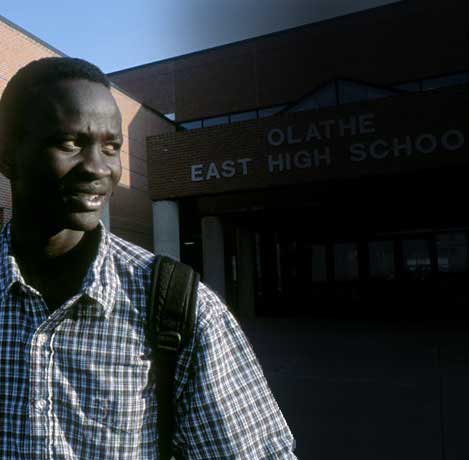 It was probably not their main intention, but the makers of the documentary Lost Boys of Sudan seem to raise the question: which is better, life as a refugee in Kenya, or life in poverty in America?
It was probably not their main intention, but the makers of the documentary Lost Boys of Sudan seem to raise the question: which is better, life as a refugee in Kenya, or life in poverty in America?We meet its two subjects, Peter and Santino, when they are still at the refugee camp in Kakuma, a desolate area in the Kenyan desert. We are told that they have lived there already for ten years, and along the way we get a glimpse of the other horrors they have already faced: villages ransacked, parents killed, rivers crossed at gunpoint. The documentary is mainly concerned with their latest journey though, as immigrants to the United States.
Interestingly, Peter and Santino left Kakuma just weeks before Valentino Achak Deng, the narrator of the recent Dave Eggers novel What is the What? Eggers' book first drew my attention to the Lost Boys, and many scenes are shared by that book and this film: the huts and basketball courts of the refugee camp, the board where names are posted of the boys selected to move to America, the promises and emotional farewells to those staying behind, the plane ride from Kakuma to Nairobi, then on to the United States.
Every immigrant story is a little different, but these Lost Boys' stories all have some common themes. Coming to America is seen as something like a trip to heaven, and the rapturous smiles of the boys as they board the planes and arrive at the airport in Houston are almost heartbreaking. The disappointments come quickly and from all sides: low-paying jobs, difficulties with school, medical and legal problems, struggles to form and maintain relationships. Money is tight, social situations are strange and awkward, relatives back in Africa are demanding, and both Peter and Santino find themselves disillusioned with America.
These Lost Boys are incredibly strong, religious, determined people - they would not have survived otherwise - and it's a testament to their strengths that Peter, Santino, and Valentino all eventually managed to get a foothold. It's interesting to see just how many problems they have had to overcome, though, and how those problems have differed from those they faced in Sudan. Whereas in Africa they faced gunfire, starvation, and lions, here they cope with loneliness, discrimination, and alienation. As filmmaker Megan Mylan notes, in Sudan they had eachother, no matter how harsh the situations they faced. As those social connections fray in America, all of their problems seem to worsen, and the loneliness becomes almost unbearable.
So for all the material advantages, the Lost Boys have some ambivalence about life in the United States. As hard as it is to comprehend all they survived in Sudan, it's easy to understand this American part of the Lost Boys' story, and to sympathize with their plight.


 Technorati Link Count: no. of blog reactions to this post
Technorati Link Count: no. of blog reactions to this post
1 comment:
Hi Matt,
It's Whitney Bullock (violist) - I was at Spoleto with you and I've been down to Miami to sub a few times. Anyways, I read the NY Times article and I've been perusing your blog! This entry had me wondering, have you seen the other documentary about the Lost Boys? It's called "God Grew Tired of Us". I highly recommend it.
http://www.godgrewtiredofus.com/
Hope all is well in Miami!
- Whitney
Post a Comment